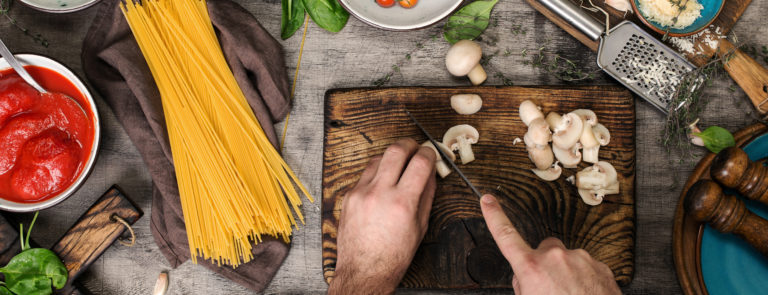10% off £35
High protein vegetables and grains
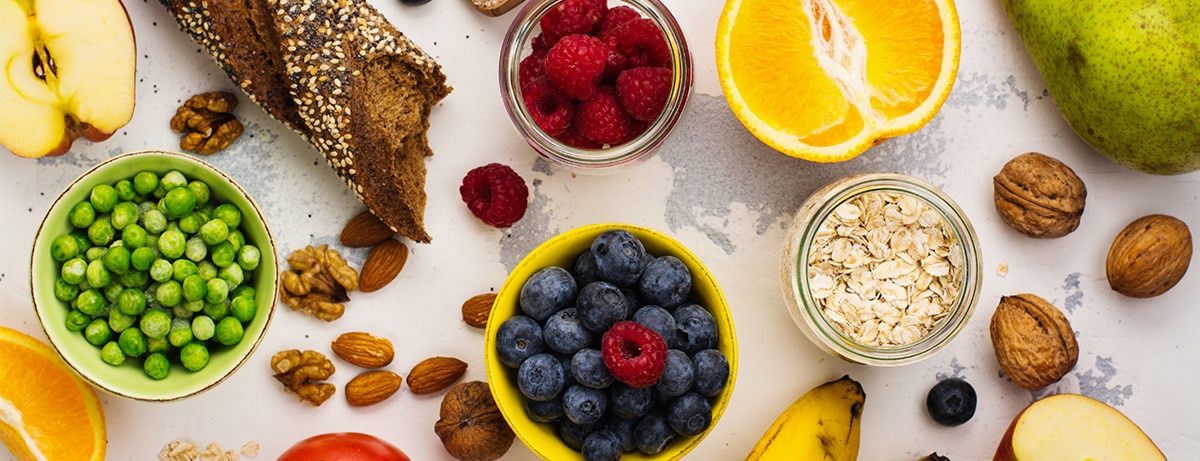
Protein is one of the most important macronutrients you need to consider when planning a healthy, nourishing diet. Not only does it help every cell in the body grow and repair itself, but evidence has also shown that protein is filling and encourages the body to improve muscle strength .
You don’t need to eat meat or fish to get enough protein either. There are several plant-based sources of this nutrient that supply the protein the body needs.
Here we’ve covered some of the best high protein vegetables and grains that you can include in your healthy high protein meals and recipes.
Skip to: What is plant protein? | Do vegetables have protein? | Are grains high in protein? | 5 high protein vegetables | 5 high protein grains.
What is plant protein?
As the name suggests, plant protein is protein that’s derived totally from plants. These sources can include legumes, grains, nuts, and seeds, as well as certain vegetables, and are an essential part of a plant-based diet as they provide the necessary amino acids needed for our bodies to build, recover, and grow.
While most animal sources of protein, like eggs, meat, or fish, are complete proteins (meaning they contain all the essential amino acids our bodies need), not many plant products contain much protein at all, let alone complete proteins.
This means that vegetarians and vegans may need to pay a little more attention to what they’re eating in order to hit their daily protein goals. But it doesn’t need to be stressful – a well-balanced plant-based diet that includes a variety of vegetables and grains can still provide all the essential amino acids your body needs.
Our ultimate guide to plant-based protein covers this in more depth.
Do vegetables have protein?
Do vegetables have protein?
Yes, vegetables do contain protein, although the exact content can vary a lot depending on the type of vegetable. Generally, legumes provide a higher amount of protein, but vegetables like spinach, broccoli, peas, potatoes, kale, and brussels sprouts can all help add towards your daily goals.
It’s important to note that while vegetables will contribute to your daily protein intake, they’re not complete protein sources, so they won’t contain all the essential amino acids your body needs. This is why it’s important to consume a varied diet with a range of plant-based protein sources like nuts, seeds, and grains (as well as meat alternatives like tofu, tempeh, or seitan). You can learn more about other vegetarian protein sources here.
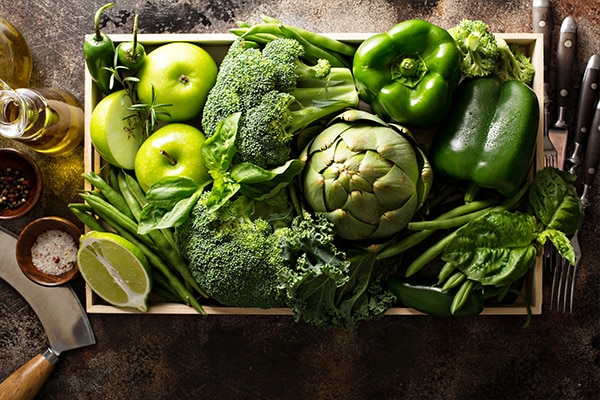

Are grains high in protein?
Like vegetables, the protein content of grains can very among different types, and while they don’t contain as much protein as, say, legumes or nuts, they’re still an excellent way to increase your daily intake. Plus, they’re packed with a host of fantastic vitamins, energy-boosting carbohydrates, dietary fibre, and nutrients, making them a staple in any healthy diet.
By mixing grains with other high protein vegetables and ingredients, you can ensure a well-balanced nutritional approach that will keep your body happy and well.
5 High Protein Vegetables
Include these protein-rich vegetables in your diet and enjoy nutritious, delicious meals and snacks that are packed with goodness. Protein numbers listed here are a rough guide – they will likely differ between products, brands, and types of vegetable.
Lentils (100g contains 24g of protein)
Lentils (100g contains 24g of protein)
Lentils are a plant-protein holy grail – not only are they packed with protein, but they’re also a complete protein, containing all nine essential amino acids that the body can’t produce on its own – a rare thing in the plant world! Nutrient-rich, high in fibre, low in fat and easy to prepare, lentils are both affordable and versatile.
Unlike many other beans and pulses - which usually need soaking before they are safe to eat - lentils can be cooked and ready to eat. Use them to add texture to vegetable soups and stews, combine them with spices to make curries or eat them cold in salads.
Handpicked content: Vegan Shepherd’s Pie
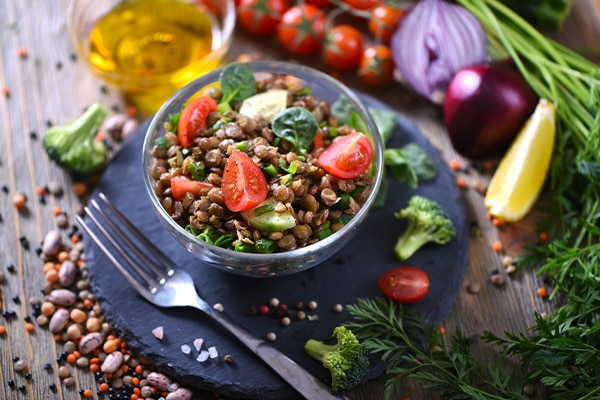

Chickpeas (100g contains 9g of protein)
Chickpeas are prized for their nutritional profile and are wonderful sources of fibre, iron, complex carbohydrates, and potassium. What’s more, eating 100g of boiled chickpeas will provide you with up to 9g of protein. Plus, they’re another complete protein, so can help support your body with all its amino acid requirements.
As well as hummus, these legumes are used in a wide variety of Middle Eastern and Mediterranean recipes. Delicious when eaten hot or cold, chickpeas are a tasty addition to stews and curries or dry roasted in the oven to make a crunchy, protein-filled snack.
Edamame beans (100g contains 11g of protein)
Edamame beans (100g contains 11g of protein)
These bright, fresh-tasting beans are young soybeans picked before they are fully developed. A staple in Japanese and Chinese diets, they are often served boiled or steamed. Rich in vitamin K and fibre, 100g of edamame beans contains 11g of complete protein.
Low in saturated fat, easy to prepare and brilliantly versatile, they can be quickly cooked by boiling or steaming, and can usually be bought fresh, frozen or in pods. Use edamame beans in salads, stir-fries, sushi or as the perfect protein-packed snack. Learn more about the benefits of edamame here.
Handpicked content: Vegan-friendly, protein-packed edamame beans
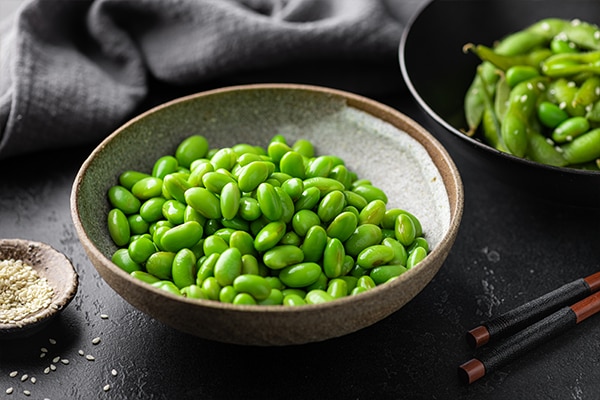

Broccoli (100g contains 3g of protein)
This cruciferous vegetable is not only rich in protein with around 3g per 100g when cooked, but it also provides various vitamins (such as vitamins C, K, A and B6), minerals (like potassium and folate), plus dietary fibre. It’s the perfect addition to your meals for a healthy, balanced diet, as you can find out in our guide to the benefits of broccoli.
There are countless ways to cook and serve this gorgeous green veg, from stir frying and roasting, to steaming or boiling. Some even love to eat it raw!
Brussels sprouts (100g contains 3.5g of protein)
Brussels sprouts (100g contains 3.5g of protein)
Love them or hate them, there’s no denying that these cute green globes are a fantastic addition to your meals if you’re hoping to increase your plant protein intake. With around 3.5g of protein per 100g, they’re also incredibly nutrient-dense, packed with vitamins C, K, A, and several B vitamins.
Plus, they contain potassium, calcium, and iron, all of which are essential for maintaining a healthy body. Not to mention that they’re rich in dietary fibre, helping with digestion. We’ve covered even more health benefits of brussels sprouts in this guide.
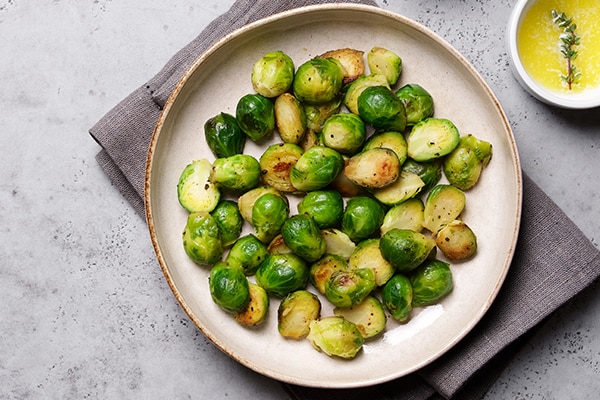

5 High Protein Grains
Grains are tiny powerhouses that can fuel your body with essential nutrients while satisfying your tastebuds and filling your tummy. Here are five of our favourite high protein grains to supercharge your meals and keep you feeling energised throughout the day.
Chia seeds (100g contains 17g of protein)
Chia seeds (100g contains 17g of protein)
Do not underestimate the nutritional power of the tiny-but-mighty chia seed. These small seeds are loaded with protein goodness, offering around 4g of protein in just two tablespoons. As well as being high in fibre, healthy fats, omega-3 fatty acids and a range of essential nutrients, they’re incredibly versatile.
Sprinkle them on top of yogurt (make it Greek for a protein double-whammy!), oatmeal or smoothies, or mix them with liquid to make puddings and jams.
Handpicked content: Three great recipes that use chia seeds
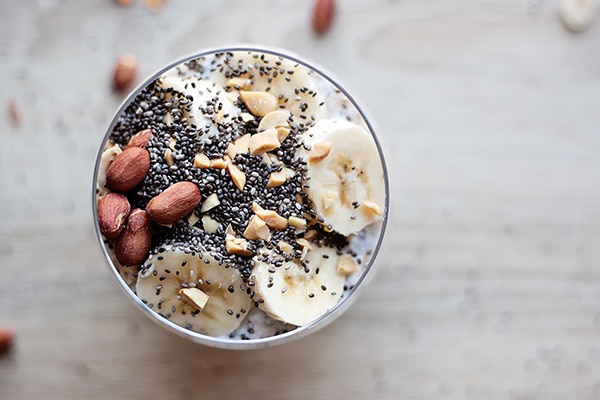

Oats (100g contains 11 of protein)
If that morning bowl of porridge doesn’t quite fill you up all the way to lunchtime, 100g of oats contains 11g of protein and is a great alternative. This whole grain has been eaten for centuries, providing slow-release carbohydrates and fibre and a range of vitamins and minerals (all of which we cover in more detail in our health benefits of oats guide).
So don’t just save them for breakfast. Bake oats into flapjacks, use them to make homemade bean burgers or sprinkle them over sautéed vegetables and bake in the oven for a hearty veggie crumble.
Handpicked content: Cranberry and pistachio flapjacks
Quinoa (100g contains 4.4g of protein)
Quinoa (100g contains 4.4g of protein)
Not only will quinoa keep you feeling satisfied, but you can also count on each 100g of cooked quinoa to provide 4.4g of protein. With a nut-like flavour and firm texture, it has steadily gained popularity in recent years – learn why in our guide to the many benefits of quinoa.
A complete protein, it contains all the essential amino acids our bodies need from our diets. Boil for 15 to 20 minutes and use in place of rice or couscous.
Handpicked content: Three tasty ways to eat quinoa
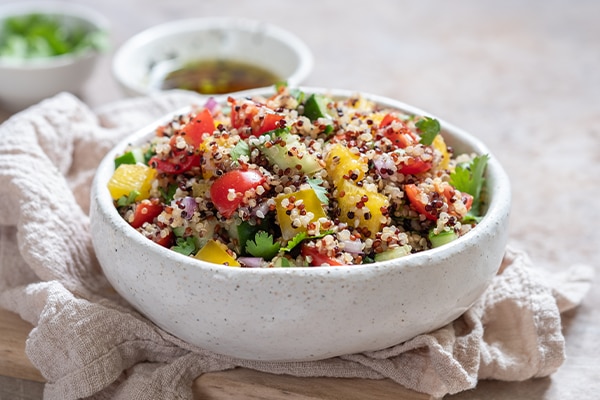

Buckwheat (100g contains 9g of protein)
Another fabulous complete protein, buckwheat’s nutty and earthly flavour makes it a versatile addition to your meals, whether in porridge, salads or as a hearty side dish. Containing around 9g of protein per 100g, buckwheat is also rich in fibre, and an excellent source of various essential vitamins and minerals, including magnesium, potassium, zinc, and B vitamins. You can discover more health benefits of buckwheat here.
Farro (100g contains 13.5g of protein)
Farro is an ancient grain, offering an impressive protein boost with a whopping 13.5g of per 100g. Rich in dietary fibre, it’s great for your digestive health and will keep you feeling full. Plus, it offers essential nutrients like magnesium, iron, and B vitamins.
Stir it into soups, mix into a heart salad or add it to stews for a satisfying, delicious and healthy high protein meal.
Handpicked content: Seven best super grains
A high protein diet doesn’t always mean it has to be focused on meat and dairy, there are lots of high protein vegetables and grains out there too. From delicious options such as quinoa and lentils to tasty chickpeas, spinach, and broccoli you can boost your protein with healthy veggies and grains.
So, why not add these veggies and grains to your next food shop?
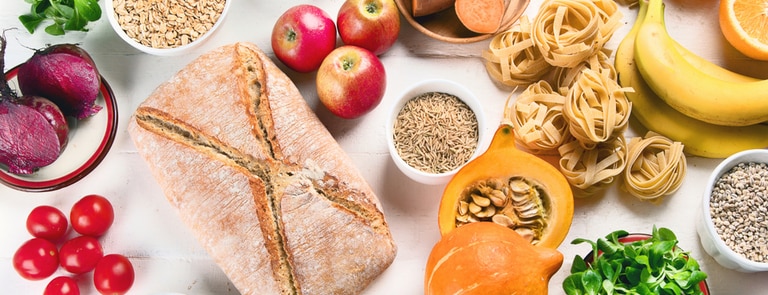
.png)
